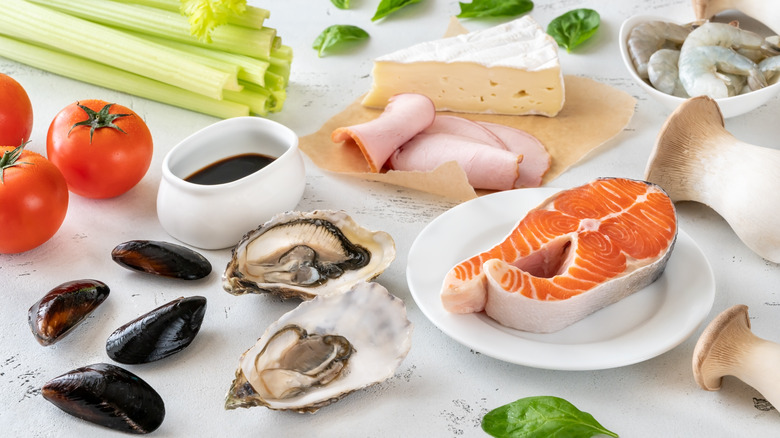The Real Reason Scientists Are So Intrigued By Umami
In the world of cuisine, the flavor of umami is commonly known as the fifth element in addition to the sour, sweet, bitter, and salty profiles that our palate is familiar with. Translated literally, the Japanese word "umami" means "essence of deliciousness" (via Ajinomoto), and the taste of it can be found in various foods like mushrooms, tomatoes, soy sauce, and cheese. According to Healthline, "umami flavors make your mouth water, which can improve the taste of food." Lovers of strong, sharp cheeses have likely experienced a ping of disappointment after having a more mild-tasting cheese. That's your tongue missing that rich umami zing.
In 1908, Japanese chemist Kikunae Ikeda identified monosodium glutamate, better known as MSG, as the first umami seasoning to be used as a savory food additive. According to Umami Information Center, Ikeda had "a strong desire to improve the nutritional status of Japanese people back home," so his mission to transform society began with the creation of this appetizing flavor enhancer. Umami naturally occurs in foods high in glutamates like aged cheese and cooked beef — when combined with other ingredients, it can concoct a heavenly mouthful of goodness. Following Ikeda's footsteps, food scientists hope to use it as a positive force for change in the world.
More umami means less salt
Dr. Paul Breslin, Professor of Nutritional Sciences at Monell University, studies how people orally perceive specific tastes like umami. According to FoodNavigator.com, Dr. Breslin hopes that the implications of the results will help the eating process for those who are malnourished. He emphasizes, "What you want are things that are very tasty that kids will eat, that will go down easy and will help them" (via The Guardian). Others, like Professor Margot Gosney, chair of the Academic and Research Committee of the British Geriatrics Society, want to use umami to increase the appeal of hospital food without dumping salt into it. This could be an important step in reducing our overall salt intake as we use the power of the fifth taste profile to season our meals.
Try experimenting with umami-rich ingredients to see what delicious new flavor combinations you can come up with! Adding soy sauce or garlic to your dishes can boost any meal's taste by infusing it with the right amount of savory zest.

